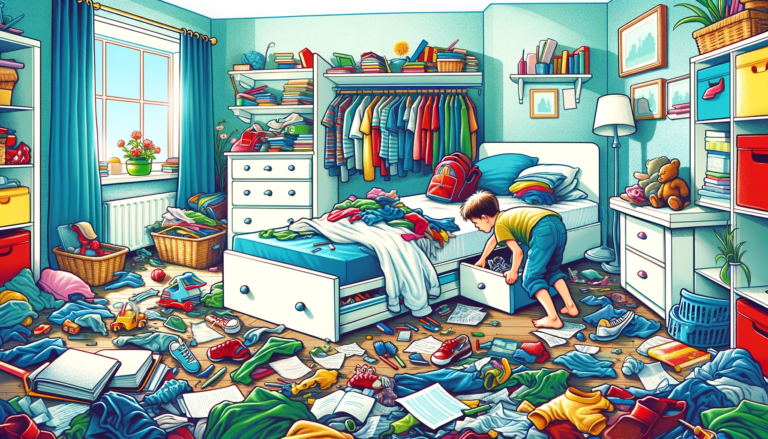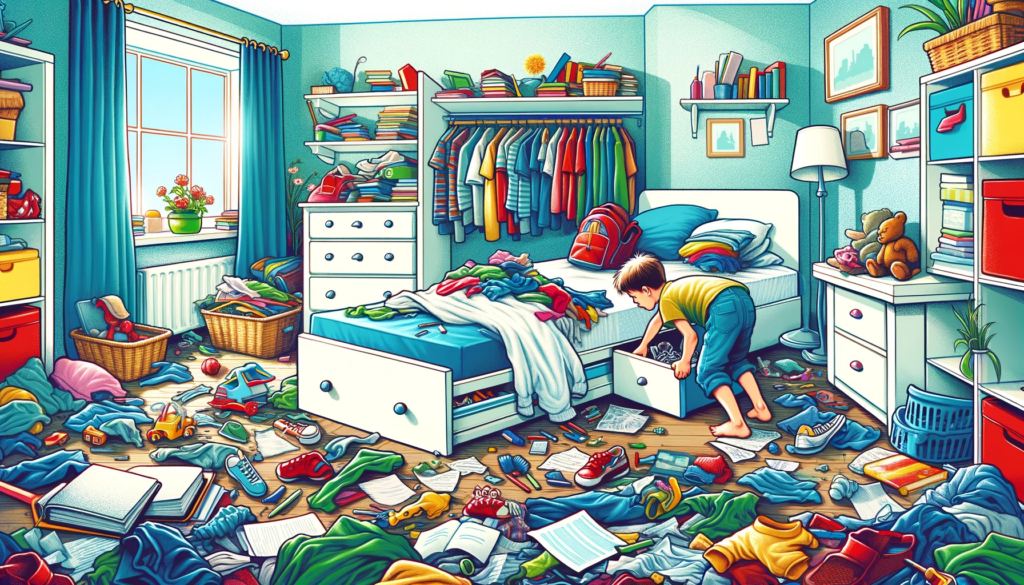Where in the Home? A2
- Home
- »
- English Teaching Resources
- »
- A2 – Pre-Intermediate
- »
- Where in the Home? | A2
This is a free A2 pre-intermediate level English reading lesson about household items. It includes the reading and reading comprehension exercises in 4 different formats together with the answer keys and explanations.
- True/False questions
- Multiple choice questions
- Short answer questions
- Multiple choice cloze exercise

Where in the Home?

Table of Contents
Where in the Home?
John woke up late today. He had a problem. His glasses were not on the bedside table. He needed them to see well. He looked on his bed. He looked under his bed. The glasses were not there. John felt worried.
He went to the kitchen next. Maybe his glasses were on the table. He often reads there. But no, they were not on the kitchen table. He checked under the table too. John found only an old sock.
Then John remembered the living room. He had been there last night. He looked all around. He checked on the shelves. He searched under the couch. He even lifted the rug. But his glasses were not there.
John thought hard. Where else could they be? He went up to his room again. This time he looked on top of his dresser. Nothing was there. He checked in his drawers. Still, he could not find them.
He felt sad and sat down on his bed. Just then, he touched something on his head. It was a surprise. His glasses were on his head all the time! He laughed at himself and was happy. Now he could see clearly again.
CEFR Level Card
General Level: A2.0
Vocabulary: A1.5
Verb Forms: A1.8
Sentences: A1.3
Vocabulary
bedside NOUN B1 x1
Definition (En):
- space by the side of a bed (especially the bed of a sick or dying person)
couch NOUN B2 x1
Definition (En):
- a flat coat of paint or varnish used by artists as a primer
n. a narrow bed on which a patient lies during psychiatric or psychoanalytic treatment
dresser NOUN C1 x1
Definition (En):
- a person who dresses in a particular way
n. a wardrobe assistant for an actor
n. a cabinet with shelves
rug NOUN B1 x1
Definition (En):
- floor covering consisting of a piece of thick heavy fabric (usually with nap or pile)
Phrases
PHRASE | COUNT | SENTENCES |
all the time | 1 |
|
be on someone’s head | 1 |
|
be on the table | 1 |
|
on top of (someone or something) | 1 |
|
sit down on (someone or something) | 1 |
|
Reading Comprehension Exercises
True / False
- John lost his glasses while cooking in the kitchen.
- John’s glasses were hidden under his bed.
- John was able to find an old sock in the kitchen.
- John thought his glasses might be in the living room because he used them there the night before.
- John never checked on top of his dresser for his glasses.
- John found his glasses after looking in the living room.
- John laughed because he was frustrated that he could not find his glasses.
- John found his glasses right after he gave up looking for them.
- John needs his glasses to hear things better.
- John’s glasses were on his head while he was searching for them.
Multiple Choice
1) Why was John worried in the beginning?
A) He woke up late
B) His bed was uncomfortable
C) His glasses were missing
D) He found an old sock
2) Where did John look for his glasses first?
A) In the kitchen
B) In the living room
C) On his bed and under it
D) In his room
3) Why did John check the kitchen table for his glasses?
A) He sleeps there
B) He reads there
C) He lost them before
D) He wanted to find the old sock
4) What did John find under the kitchen table?
A) His glasses
B) Nothing
C) An old sock
D) His book
5) After looking in several places, where were the glasses found?
A) On his head
B) Under the bed
C) In the living room
D) On the kitchen table
6) How did John feel when he realized where his glasses were?
A) Angry
B) Sad
C) Happy
D) Worried
7) What did John do after sitting on the bed at the end?
A) Went back to the kitchen
B) Looked under the bed
C) Found his glasses on his head
D) Checked the living room again
Short Answer
- Why did John feel worried?
- Where does John usually read?
- What did John find under the kitchen table?
- Where was John last night?
- What was John’s reaction when he found his glasses?
- Where did John find his glasses at last?
- How did John search for his glasses in his room when he went back?
Multiple Choice Cloze
John woke up ___1___ today. He had a problem. His glasses were not on the ___2___ table. He needed them to see well. He looked on his bed. He looked under his bed. The glasses were not there. John felt ___3___.
He went to the kitchen ___4___. Maybe his glasses were on the table. He often reads there. But no, they were not on the kitchen table. He ___5___ under the table too. John found only an old sock.
Then John remembered the living room. He had been there last night. He looked all around. He ___6___ on the shelves. He searched under the couch. He even lifted the rug. But his glasses were not there.
John thought hard. Where else could they be? He went up to his room again. This time he looked on ___7___ of his dresser. Nothing was there. He checked in his drawers. Still, he could not ___8___ them.
He felt sad and sat down on his bed. Just then, he ___9___ something on his head. It was a surprise. His glasses were on his head all the ___10___! He laughed at himself and was happy. Now he could see clearly again.
1) A. late B. early C. quick D. fast
2) A. beside B. below C. between D. bedside
3) A. happy B. worried C. excited D. calm
4) A. last B. first C. next D. then
5) A. checked B. looked C. found D. threw
6) A. lifted B. checked C. moved D. opened
7) A. top B. bottom C. side D. back
8) A. look B. find C. see D. watch
9) A. looked B. touched C. felt D. saw
10) A. time B. place C. day D. moment
Exercise Answers
True / False Answers
- False
Explanation: The text says John went to the kitchen to look for his glasses; it does not say he lost them there.
(“He went to the kitchen next. Maybe his glasses were on the table.”)
- False
Explanation: The text clearly states that John’s glasses were not under his bed.
(“He looked under his bed. The glasses were not there.”)
- True
Explanation: The text says that John found an old sock when he checked under the kitchen table.
(“He checked under the table too. John found only an old sock.”)
- True
Explanation: The text indicates that John thought to look in the living room because he remembered being there the previous night.
(“Then John remembered the living room. He had been there last night.”)
- False
Explanation: The text mentions that John did indeed check on top of his dresser for his glasses.
(“This time he looked on top of his dresser.”)
- False
Explanation: The text says that John did not find his glasses in the living room.
(“But his glasses were not there.”)
- False
Explanation: The text indicates John laughed at himself and was happy, which suggests he was not frustrated.
(“He laughed at himself and was happy.”)
- True
Explanation: The text suggests that John found his glasses on his head after he sat down, presumably giving up the search.
(“He felt sad and sat down on his bed. Just then, he touched something on his head.”)
- False
Explanation: The text says that John needs his glasses to see well, not to hear better.
(“He needed them to see well.”)
- True
Explanation: The text reveals that John’s glasses were on his head the whole time he was looking for them.
(“His glasses were on his head all the time!”)
Multiple Choice Answers
- C
Explanation: John felt worried because he couldn’t find his glasses, which he needed to see well.
(“He had a problem. His glasses were not on the bedside table.”)
- C
Explanation: The first places John checked were on his bed and under it.
(“He looked on his bed. He looked under his bed.”)
- B
Explanation: John checked the kitchen table because it’s a place where he often reads.
(“Maybe his glasses were on the table. He often reads there.”)
- C
Explanation: John only found an old sock under the kitchen table, not his glasses.
(“He checked under the table too. John found only an old sock.”)
- A
Explanation: The glasses were found on John’s head.
(“He touched something on his head. His glasses were on his head all the time!”)
- C
Explanation: John felt happy when he found his glasses on his head.
(“He laughed at himself and was happy.”)
- C
Explanation: John found his glasses on his head after sitting down on his bed.
(“Just then, he touched something on his head. It was a surprise. His glasses were on his head all the time!”)
Short Answer Answers
- His glasses were not on the bedside table.
Explanation: John felt worried because he couldn’t find his glasses where he usually puts them.
(“His glasses were not on the bedside table.”)
- In the kitchen.
Explanation: The text suggests that John often reads in the kitchen, which is why he thought his glasses might be there.
(“Maybe his glasses were on the table. He often reads there.”)
- An old sock.
Explanation: When John checked under the kitchen table for his glasses, he found something different – an old sock.
(“John found only an old sock.”)
- In the living room.
Explanation: The text indicates that John was in the living room the night before.
(“Then John remembered the living room. He had been there last night.”)
- He laughed.
Explanation: John found the situation funny when he realized his glasses were on his head the entire time, so he laughed.
(“He laughed at himself and was happy.”)
- On his head.
Explanation: The text tells us that John’s glasses were unexpectedly on his head when he felt them as he sat down.
(“His glasses were on his head all the time!”)
- He looked on top of his dresser and in his drawers.
Explanation: John’s thorough search in his room included looking on top of the dresser and checking inside his drawers.
(“This time he looked on top of his dresser. Nothing was there. He checked in his drawers.”)
Multiple Choice Cloze Answers
- A
Explanation: ‘Late’ is the opposite of ‘early’.
- D
Explanation: ‘Bedside’ means next to the bed.
- B
Explanation: ‘Worried’ means feeling anxiety or concern.
- C
Explanation: ‘Next’ means the following or coming one.
- A
Explanation: ‘Checked’ means to examine something.
- B
Explanation: ‘Checked’ means to make an examination or inspection.
- A
Explanation: ‘Top’ means the highest part or point.
- B
Explanation: ‘Find’ means to discover by searching.
- B
Explanation: ‘Touched’ means to come into contact with.
- A
Explanation: ‘Time’ indicates the entire period.
Craft your own reading lessons in minutes
On Cathoven, you can create readings and exercises tailored to specific vocabulary, grammar points, and proficiency levels, all within minutes.

